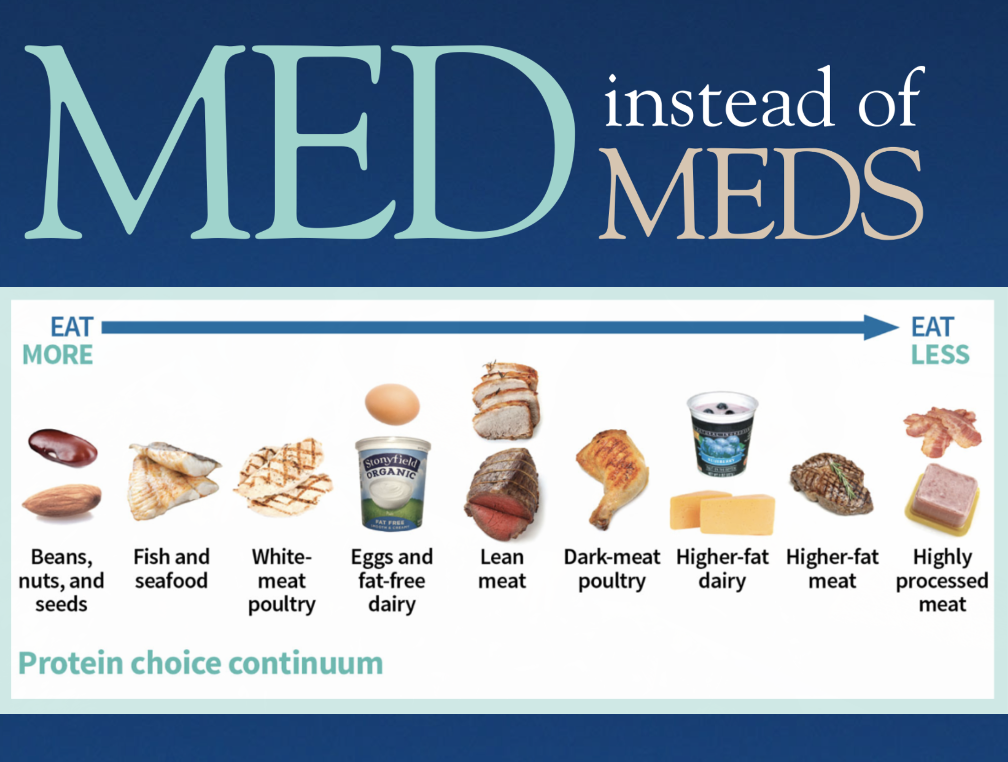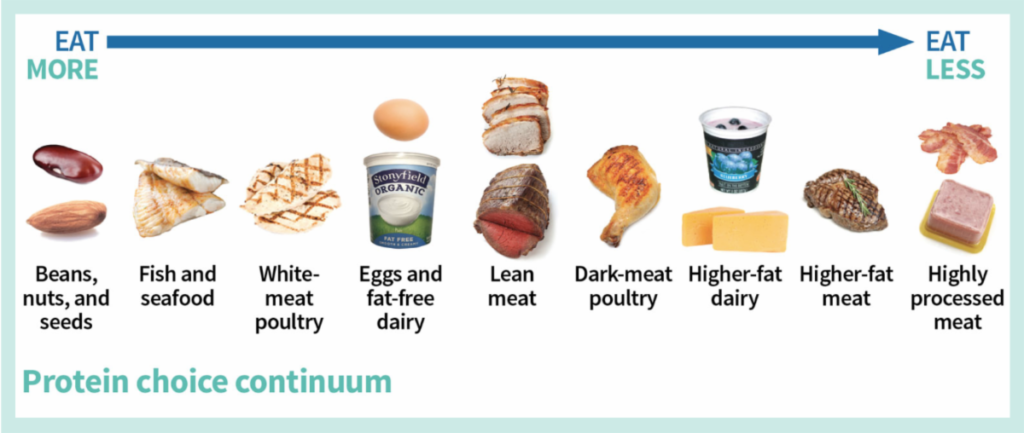Have you heard of Med Instead of Meds?

It’s easy for patients to get overwhelmed as they make grocery selections, but it’s just as easy to commit to a few specific areas of evidence-based dietary change that have demonstrated improvements in chronic disease.
The Mediterranean Diet is one of the best studied nutritional approaches and easiest for lifestyle adaptation.1 A few tenets of the Mediterranean Diet are:

- Decrease or eliminate sweetened beverages,
- Swap some animal protein for disease-fighting plant proteins (like beans and lentils),
- Bump up the consumption of fruits and vegetables.
This is not a change to completely different flavors, but a way to reexamine how to construct a daily diet from healthy whole foods. For example, instead of ground beef style chili, swap half of the ground beef in your recipe to plant-protein-power-packed lentils and add some black beans for a dose of anthocyanins. The lentils will soak up the flavor of the chili and even have a similar texture to ground beef. They will also offer a boost of fiber, B vitamins, iron and magnesium.
Small, unnoticeable changes may encourage patients to look for other places where they might substitute some of their animal protein for plant protein, helping to decrease sodium, cholesterol, and saturated fat while increasing fiber, vitamins, minerals, and phytochemicals. These phytochemicals can fight inflammation and prevent or even treat diabetes!2 Phytochemicals like anthocyanins will act like DPP inhibitors in the body to reduce blood sugar levels.3 These chemicals can also make the body less insulin resistant.4
Explore the program Med Instead of Meds–the wordplay is Med(iterranean Diet) Instead of Med(icine)s. Learn more about how seven small shifts in diet can make a big difference in health. Rather than strict elimination, the strategy is to consider food on a health continuum where consumers should aim for inclusion of more healthy options and fewer less healthy options. This website is a great resource to share with patients. In many counties in North Carolina, the Cooperative Extension Service offers regular guided classes, supported by cooking demonstrations to introduce the dietary shifts in convenient and economically efficient ways. The support offered by the Extension agent along with the peer accountability is a great way to build strong, lasting habits.

Citations
1) Salas-Salvadó, J., Becerra-Tomás, N., García-Gavilán, J. F., Bulló, M., & Barrubés, L. (2018). Mediterranean Diet and Cardiovascular Disease Prevention: What Do We Know? Progress in cardiovascular diseases, 61(1), 62–67.
2) Kalt, W., Cassidy, A., Howard, L. R., Krikorian, R., Stull, A. J., Tremblay, F., & Zamora-Ros, R. (2020). Recent Research on the Health Benefits of Blueberries and Their Anthocyanins. Advances in nutrition (Bethesda, Md.), 11(2), 224–236.
3) Fan, J., Johnson, M. H., Lila, M. A.*, Yousef, G., & de Mejia, E. G. (2013). Berry and Citrus Phenolic Compounds Inhibit Dipeptidyl Peptidase IV: Implications in Diabetes Management. Evidence-based complementary and alternative medicine : eCAM, 2013, 479505.
4) Różańska, D., & Regulska-Ilow, B. (2018). The significance of anthocyanins in the prevention and treatment of type 2 diabetes. Advances in clinical and experimental medicine : official organ Wroclaw Medical University, 27(1), 135–142.
*Mary Ann Lila is a faculty researcher at NC State University Plants for Human Health Institute.
This article was part of the April 2022 e-news FRESH Rx. Subscribe for similar content delivered to your inbox monthly.
- Categories: